The General Synod is the title of the governing body of some church organizations.
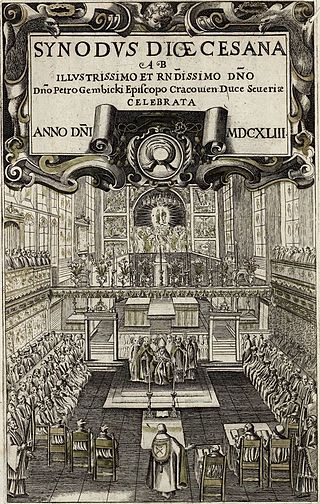
A synod is a council of a Christian denomination, usually convened to decide an issue of doctrine, administration or application. The word synod comes from the Ancient Greek σύνοδος 'assembly, meeting'; the term is analogous with the Latin word concilium'council'. Originally, synods were meetings of bishops, and the word is still used in that sense in Catholicism, Oriental Orthodoxy and Eastern Orthodoxy. In modern usage, the word often refers to the governing body of a particular church, whether its members are meeting or not. It is also sometimes used to refer to a church that is governed by a synod.

The Church of Ireland is a Christian church in Ireland, and an autonomous province of the Anglican Communion. It is organised on an all-Ireland basis and is the second-largest Christian church on the island after the Roman Catholic Church. Like other Anglican churches, it has retained elements of pre-Reformation practice, notably its episcopal polity, while rejecting the primacy of the pope.
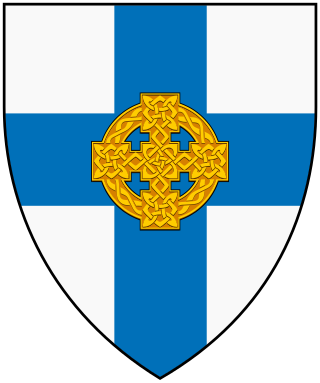
The Church in Wales is an Anglican church in Wales, composed of six dioceses.

The Episcopal Church of Jerusalem and the Middle East is a province of the Anglican Communion. The primate of the church is called President Bishop and represents the Church at the international Anglican Communion Primates' Meetings. The Central Synod of the church is its deliberative and legislative organ.

The post of Archbishop of Wales was created in 1920 when the Church in Wales was separated from the Church of England and disestablished. The four historic Welsh dioceses had previously formed part of the Province of Canterbury, and so came under its Archbishop. The new Church became the Welsh province of the Anglican Communion.
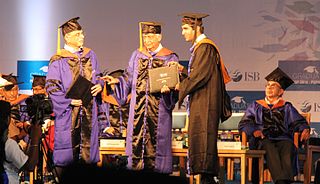
A convocation is a group of people formally assembled for a special purpose, mostly ecclesiastical or academic. The Britanica dictionary defines it as "a large formal meeting of people.
The General Convention is the primary governing and legislative body of the Episcopal Church in the United States of America. With the exception of the Bible, the Book of Common Prayer, and the Constitution and Canons, it is the ultimate authority in the Episcopal Church, being the bureaucratic facility through which the collegial function of the episcopate is exercised. General Convention comprises two houses: the House of Deputies and the House of Bishops. It meets regularly once every three years; however, the House of Bishops meets regularly in between sessions of General Convention. The Bishops have the right to call special meetings of General Convention.

The Anglican Church of Canada is the province of the Anglican Communion in Canada. The official French-language name is l'Église anglicane du Canada. In 2022, the Anglican Church counted 294,931 members on parish rolls in 1,978 congregations, organized into 1,498 parishes. The 2021 Canadian census counted 1,134,315 self-identified Anglicans, making the Anglican Church the third-largest Canadian church after the Catholic Church and the United Church of Canada.

The General Synod is the tricameral deliberative and legislative organ of the Church of England. The synod was instituted in 1970, replacing the Church Assembly, and is the culmination of a process of rediscovering self-government for the Church of England that had started in the 1850s.

The Bishop of Llandaff is the ordinary of the Church in Wales Diocese of Llandaff.
In the Anglican Communion, the model of government is the 'Bishop in Synod', meaning that a diocese is governed by a bishop acting with the advice and consent of representatives of the clergy and laity of the diocese. In much of the Communion the body by which this representation is achieved is called the diocesan synod.
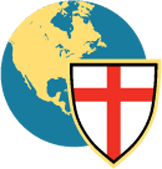
The Anglican Church in North America (ACNA) is a Christian denomination in the Anglican tradition in the United States and Canada. It also includes ten congregations in Mexico, two mission churches in Guatemala, and a missionary diocese in Cuba. Headquartered in Ambridge, Pennsylvania, the church reported more than 1,000 congregations and more than 128,000 members in 2023. The first archbishop of the ACNA was Robert Duncan, who was succeeded by Foley Beach in 2014. In June 2024, the College of Bishops elected Steve Wood as the third archbishop of the ACNA. Authority was transferred to him during the closing Eucharist at the ACNA Assembly 2024 conference in Latrobe, Pennsylvania.
The General Synod of Hong Kong Sheng Kung Hui exercises the metropolitical authority of the Anglican Province of Hong Kong Sheng Kung Hui. It is a tricameral synod which governs the Province and has the final authority in all matters affecting life, order and canonical discipline of the Church. Its chairperson is the Archbishop of Hong Kong.

The Diocese of Quincy was a diocese of the Episcopal Church in western Illinois from 1877 to 2013. The cathedral seat was originally in Quincy, Illinois but was moved to St. Paul's Cathedral in Peoria in 1963. In order to avoid confusion with the Roman Catholic Diocese of Peoria, the diocese retained the name of the location of its original "home" city, Quincy, where its cathedral seat was St. John's.

The ordination of women in the Anglican Communion has been increasingly common in certain provinces since the 1970s. Several provinces, however, and certain dioceses within otherwise ordaining provinces, continue to ordain only men. Disputes over the ordination of women have contributed to the establishment and growth of progressive tendencies, such as the Anglican realignment and Continuing Anglican movements.
The Representative Body of the Church in Wales is a registered charity, regulated by the Charity Commission for England and Wales, responsible for holding property and assets on behalf of the Church in Wales. It was set up in 1917 to oversee the financial arrangements of the new province of the Anglican Communion when the Church in Wales split off from the Church of England in 1920.
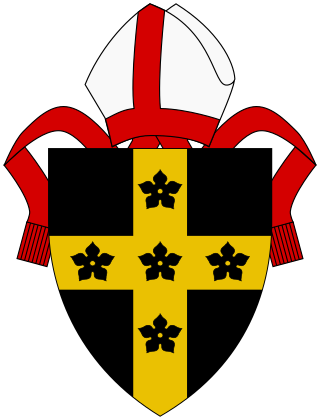
The Bishop of St Davids is the ordinary of the Church in Wales Diocese of St Davids.
The House of Bishops is the upper house of the tricameral Church of England General Synod legislature. It consists of all 42 Diocesan Bishops of the Church of England's Provinces of Canterbury and York as well as nine elected suffragan bishops. This is not to be confused with the Lords Spiritual, the most senior bishops in the Church of England sitting in the House of Lords ex officio.













